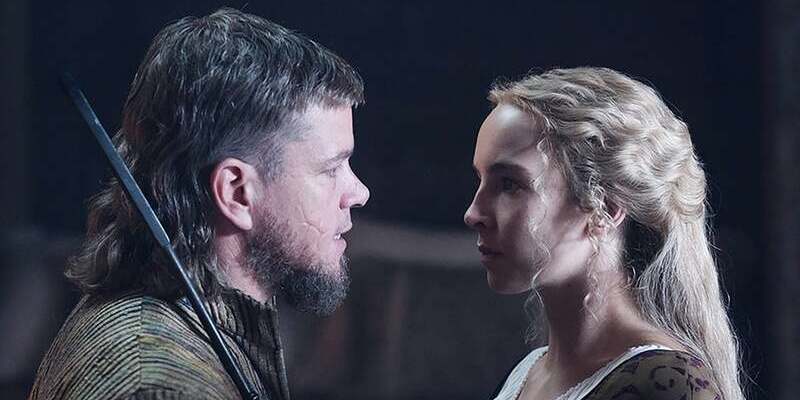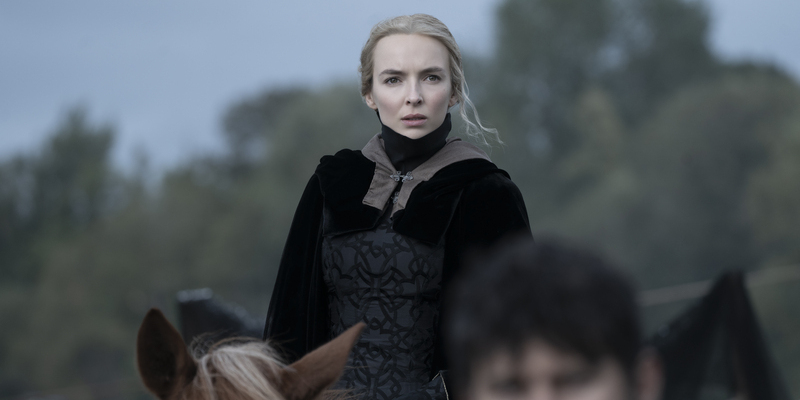
Review by
Eric Hillis
Directed by: Ridley Scott
Starring: Matt Damon, Adam Driver, Jodie Comer, Ben Affleck,
Harriet Walter, Nathaniel Parker

After helping to revolutionise the TV commercial, director
Ridley Scott made his feature film debut in 1977 with
The Duellists. That movie told the story of two French noblemen who engage in a series
of duels. Now at what is presumably the tail end of his long and remarkably
prolific career, Scott tells another tale of duelling Gallic toffs.
As its title suggests, The Last Duel tells the story of the
last legally sanctioned duel to be fought in France. It's the late 14th
century, and Jean de Carrouges (Matt Damon) has been knighted and is
rising up the ladder of the nobility. He takes a young bride in Marguerite
(Jodie Comer), the daughter of a disgraced nobleman. Marguerite
catches the eye of Jean's former friend Jacques Le Gris (Adam Driver), a squire turned debt collector for Count Pierre d'Alençon (Ben Affleck).

When Jean returns home from a trip away he is shocked when Marguerite
reveals that she was visited in his absence by Jacques, who raped her. Jean
immediately challenges Jacques to a duel to the death. Should Jean lose the
bout, not only will he be killed but Marguerite will also be executed.
Scott and his screenwriting trio of Damon, Affleck and
Nicole Holofcener adopt a Rashomon-esque storytelling approach. We first witness the story as told by Jean,
then by Jacques and finally by Marguerite. Each account opens with a card
that reads "The truth as told by..." but in the case of Marguerite, the
words "The truth" are left to linger alone on screen for a couple of
seconds.

If, as such a move implies, the film has decided that Marguerite's version
of the story is the definitive one, we're left to wonder why it bothers
making us sit through the conflicting accounts of Jean and Jacques. And if
Marguerite's account carries more weight than that of the two men, why is it
devoted less time than those of her husband and her attacker? I can't help
but feel a more conventional storytelling approach might have been more
practical here, as watching the same story told in three variations leads to
quite a bit of repetition.
There's also the puzzling question of whose benefit these accounts are for?
Are we supposed to accept these stories as being relayed to a tribunal in
14th century France? If so, some of the details are rather incriminating. It
seems more likely that Jean, Jacques and Marguerite are instead relaying
their stories for the benefit of a 21st century audience. Jean and Jacques
go out of their way to portray themselves as sensitive men in touch with
their feminine sides, something which I doubt any ruling court of 14th
century France would have cared much about. Marguerite's account plays a lot
like the promo video for an American politician running for congress, making
sure to show her being kind to lowly workers and compassionate to animals.
Marguerite is portrayed as so angelic that it does a disservice to the
central premise. The woman was raped - whether or not she was a good person
shouldn't come into it.

The three stories have very different tones. Jean's account is heavy on
action sequences as he bigs up his reputation as a brave knight. Jacques' is
something of a camp comedy as he hangs out with Count Pierre, played by a
scene-stealing Affleck as a Norman Hugh Hefner. Marguerite's isn't far off a
biopic of Princess Diana. With the men's accounts,
The Last Duel certainly earns its 18 rating, with a level of
bloodshed and bawdiness not seen in a major Hollywood film of this sort in
quite some time. The action scenes, while brief, are certainly eye-catching,
the best of their type since Mel Gibson's Braveheart. While Clint Eastwood's recent movies feel very much like the work of an
old man (and that's not a knock), Scott is still constructing movies with
the energy of a filmmaker setting out on their career.
The Last Duel is at its most entertaining during Jacques'
account, which just seems wrong given he's the villain of a particularly
distasteful story. Scott's film is so bloated that it's easy to lose sight
of what it's really about, a woman being violated and then treated with
further disdain (at the time the rape of a woman was considered a property
crime against her husband). This is a story that would probably have been
more effective as a simple courtroom drama. But this is a Ridley Scott
movie, and despite his advanced age he likes to set himself a challenge with
a big canvas. There's much to admire from a technical filmmaking viewpoint
here, and it's a reminder that we'll miss the likes of Scott when they're
gone. There are also some very entertaining moments. But amid all this the
central drama of a woman's violation and her husband's narcissistic reaction
gets lost in the blood and mud.

